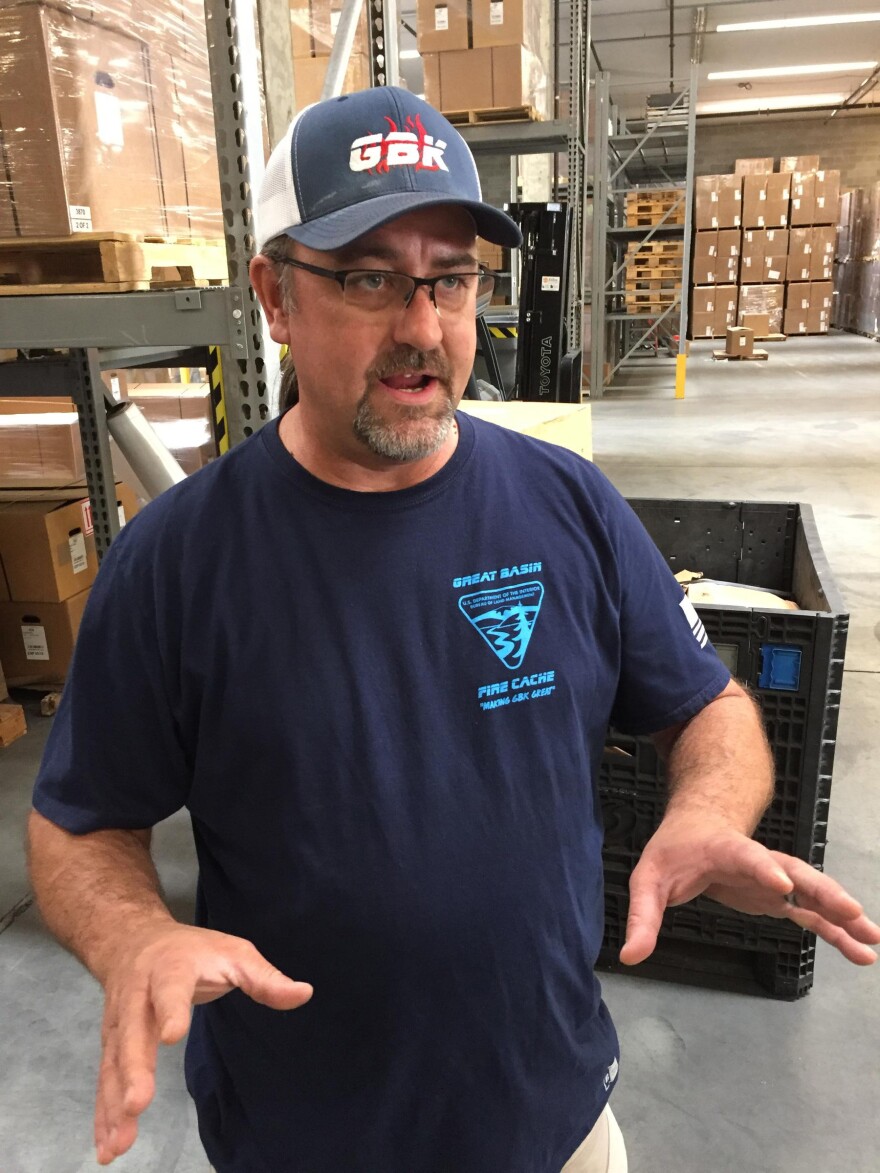With fall approaching and the weather starting to change, many of the big wildfires across the West are being tamed.
Over the course of the season, everything from tents and hoses to chainsaws and special clothing have been deployed in the fight against the flames. Tending to the effort to refurbish the millions of dollars-worth of equipment are a dwindling supply of temporary workers.
Michael Brown, a full-time employee at the National Interagency Fire Center is standing in a warehouse on the center’s Boise campus. Ask him what the facility stocks to support crews battling wildfires, and he can list it off like a champ.
“It does run the gamut,” Brown says, looking around the vast warehouse. “It goes everything from sleeping bags, pants and shirts to pumps, chainsaws – hand tools like Pulaskis and axes – gas cans, coolers, tents …”

In other words, they’ve got everything. Brown is the Returns Warehouse floor leader at the fire center’s support cache. He and his team oversee the return of all the items used on fire lines in the Great Basin region. This 80,000 square foot storage space in Idaho is one of 16 caches around the nation.
It’s spread over several warehouses that look like a Costco. Instead of industrial-size jars of mayonnaise and pallets of Cheez-Its, Brown is surrounded by neat stacks of brown cardboard boxes. He says nothing is really packaged as an individual item – it’s all kits.
“Basically, when you order a chainsaw, you don’t get just the chainsaw,” explains Brown. “You get the chainsaw, plus all the safety gear and the repair gear that you could possibly need to run that chainsaw: goggles, grease, oil.”
There are bundled kits for every aspect of fire duty.
“We have four or five different types of first aid kits,” Brown says with a smile. “We have the equipment kits: the pumps, the chainsaws, things of that nature that have something from a small engine in it. We have forms packs. We have a record retention kit.”
The items get sent out neatly packaged in the kits, but when they come back from the fire lines, everything is jumbled together on pallets. The used equipment is sorted, then it’s tested to make sure it still works. By the end of August, Brown estimated, some 310 miles of hose had been returned from Western wildfires. All of it needs testing.
Walking out of the Returns Warehouse, Brown leads the way to an area where all kinds of equipment is laid out in preparation for an inspection. There are hoses, valves and other clunky items that are most at home in a fire camp.

Standing in the shade with a number of nozzles in front of him is Jeremy Snow. He runs some water through each nozzle. Every time he opens the nozzle, a jet of water shoots out with a wet splurting sound.
“So we bleed all the air out, and then we turn on the pump, pressurize them to 300 pounds, check for leaks,” Snow explains while effortlessly giving the nozzle a once over. “A little bit [of leaking] is okay, but too much is excessive. We’ll end up fixing ‘em. This one is dripping a little bit more than it needs to, so I’ll end up adjusting that, and fixing that leak. If there are any that we can’t fix, then they get recycled.”
Snow, like many who test, organize and pack the equipment, is a seasonal employee trained by the fire center. Floor leader Michael Brown says hiring those temporary workers is becoming difficult.
“With the economy as good as it’s been, we’ve been having a harder time finding the seasonal employees,” Brown reflects. “Just everybody has a job, so not a lot of people want just one that’s only good for 90 days. It makes it tough. Boise’s a growing community and the economy is doing really well in this area.”
The unemployment rate in Boise and Idaho is below 3 percent. That’s good for the local economy but a challenge for national firefighting efforts. It’s harder to find people who want a quick, short-term job. And, according to NIFC spokeswoman Jessica Gardetto, the idea that this is temporary work may be all wrong.

“Fire is really a seasonally-based employment opportunity, and now that we’re having, quote-unquote, year-round fire activity, it’s going to change the game,” say the former firefighter knowingly. “Eventually—probably, a lot of these seasonal positions will become permanent year-round positions in the end.”
Both she and Brown are standing in the Shipping Warehouse, surrounded by hundreds of kits – packed and ready to be dispatched to fires at a moment’s notice. However, looking at the empty spaces on the shelves, all Brown sees is more work.
“We’re still not at the peak of our return season,” Brown says. “A lot of that stuff is still out in the field being used. So we have a lot more to go.”
As the weather shifts and fall storms start dousing the remaining wildfires, all that equipment will come back to the warehouse on a truck – still wet – in what the pros call “camp soup.” And, at least for this season, temporary employees will be there to clean it, test it and get it ready for the next big blaze.
For more local news, follow the KBSX newsroom on Twitter @KBSX915
Copyright 2018 Boise State Public Radio



